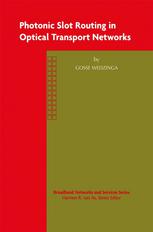

Most ebook files are in PDF format, so you can easily read them using various software such as Foxit Reader or directly on the Google Chrome browser.
Some ebook files are released by publishers in other formats such as .awz, .mobi, .epub, .fb2, etc. You may need to install specific software to read these formats on mobile/PC, such as Calibre.
Please read the tutorial at this link: https://ebookbell.com/faq
We offer FREE conversion to the popular formats you request; however, this may take some time. Therefore, right after payment, please email us, and we will try to provide the service as quickly as possible.
For some exceptional file formats or broken links (if any), please refrain from opening any disputes. Instead, email us first, and we will try to assist within a maximum of 6 hours.
EbookBell Team

4.7
66 reviewsAll-optical networking is generally believed to be the only solution for coping with the ever-increasing demands in bandwidth, such as the World Wide Web application.
Optical backbone networks efficiently achieve a high level of traffic aggregation by multiplexing numerous users on circuit-switched wavelength paths - the so-called wavelength routing approach. In contrast, the reduced level of traffic aggregation in access and metro networks makes wavelength routing solutions not adequate. In these network areas, packet-interleaved optical time-division multiplexing with its finer and more dynamic bandwidth allocation is advocated.
The book presents such an approach, known as photonic slot routing. It illustrates how this approach may provide a cost-effective solution to deploying all-optical transport networks, using today's optical device technology. To that end, the author combines DWDM-technology with fixed slot optical switching, and gives a comprehensive description of this approach in which slots are aligned across the wavelengths to form groups of data-flows that propagate as a whole inside the network. Operating algorithms are developed, and network performance is analyzed, both by means of theoretical analysis and many simulations of sample networks.
This work will be of particular interest to researchers and professionals who are active in photonic networking.